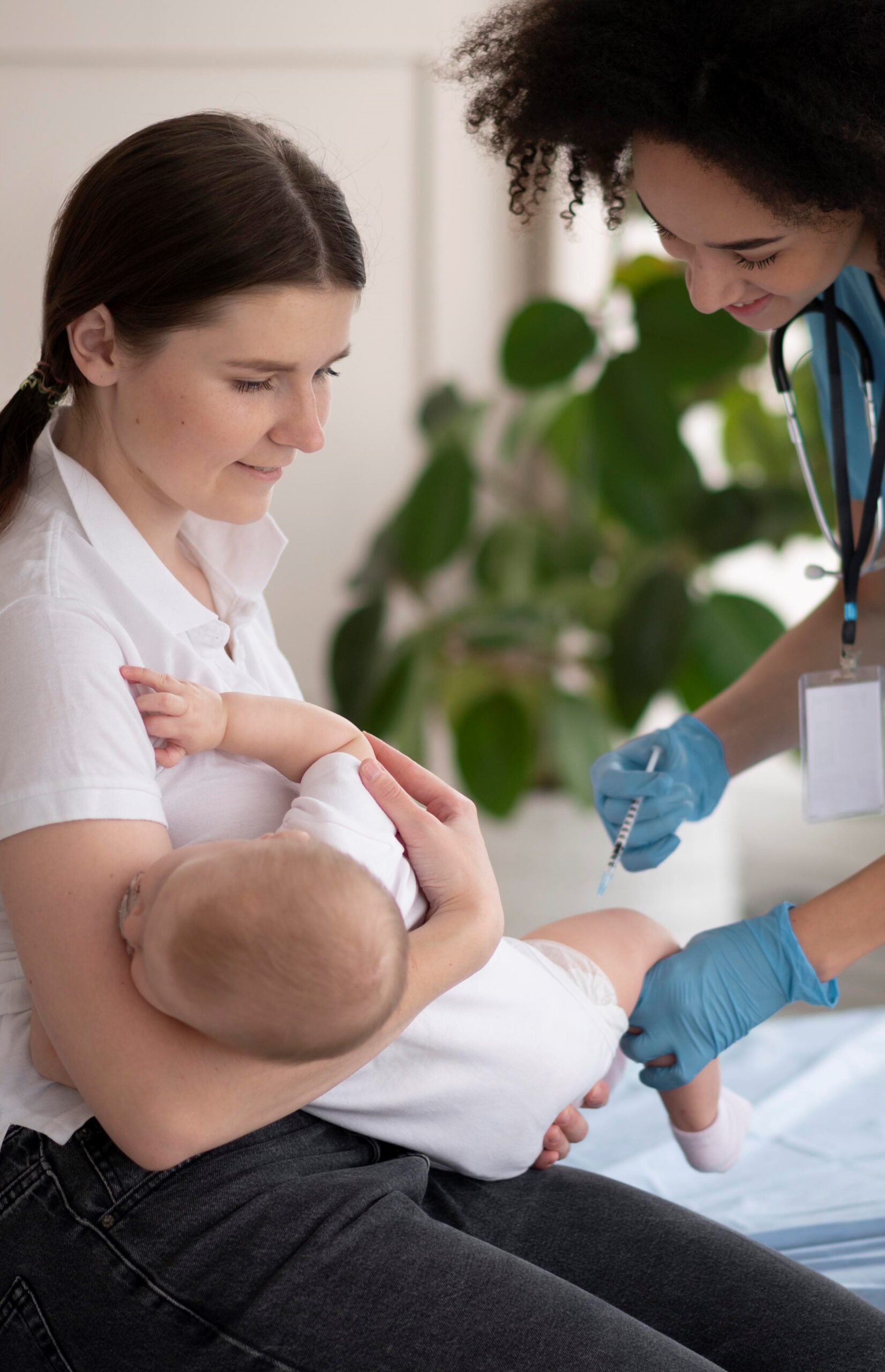
When a new member is welcomed into the family, it is a special moment for every parent. But the care of this junior one is essential to its health purpose. Staying updated about the Child’s Vaccination Routine is necessary according to age. Here, we talk about the DTaP-IPV-Hep B-Hib Vaccine.
DTwP/DTaP, Hep B2, PCV 1, Rota-1, Hib-1, and IPV-1
At six weeks, a compelling set of vaccinations is suggested for your baby. Here, we provide an overview of DTwP/DTaP, Hep B2, PCV 1, Rota-1, Hib-1, and IPV-1 vaccinations, presenting you with a more in-depth knowledge of their significance.
DTP Vaccine (DTwP / DTaP Vaccine)
DTP Vaccine is a combination of the diphtheria toxoid, tetanus and pertussis vaccines. Pertussis vaccine contains the whole cell (wP) and acellular (aP). Indicates that this vaccine contains In the case of wP, this vaccine consists of the entire pertussis organism, but in the situation of aP, it contains only one part of the pertussis organism. So, the health care provider offers the DTP Vaccine as per their Pertussis Component.
There are two recommended doses of the DTP Vaccine, i.e., Primary Dose and Booster Dose. The primary dose of this vaccine should be offered in three doses to all infants, initiating at the age of six weeks, and provided at four-week intervals. Booster doses of this vaccine are given at 16 to 24 months of age, followed by the second one at 4 to 7 years old.
How Does the DTaP/ DTwP Vaccine Work?
This vaccine works against three disorders, i.e., Diphtheria, Tetanus, and Pertussis. This vaccine is made up of Diphtheria and Tetanus Toxoids. It helps kill whole cells of the organisms that become the reason for Pertussis. To protect your child, you must take your child for the DTP vaccination at the right time.
The Correct Time For DTP Vaccine
The right timing for this vaccination is six, ten, and 14 weeks. Every parent must remember the correct age for this vaccination to protect their child from infection.
The Side Effects of the DTP Vaccine
After the DTP vaccination, your child may experience the following symptoms:
- Fever
- Appetite loss
- Vomiting
- Skin redness
- Soreness
- Fatigue
- Headache
- Swelling
- Body pain
PCV Vaccine
The Pneumococcal Vaccine is also known as the “Pneumonia Vaccine.” This vaccine requires protection against severe and potentially fatal pneumococcal disorders. The bacterium Streptococcus pneumonia causes this kind of infection. It may also contribute to pneumonia, blood poisoning (sepsis), and meningitis.
Types of PCV Vaccines
The kinds of pneumococcal vaccines are based on the medical condition and age. The PCV Vaccine is of three types, i.e.
- PCV13: Pneumococcal vaccine 13 (PCV13) is necessary for children ages 2, 4, 6, and 12-15 months. If your child has not been vaccinated with these doses, you can take them for the vaccination at 59 months or between 6 to 18 years.
- PCV15: The PCV15 or PCV20 vaccine is for adults with particular medical issues.
How Does the PCV Vaccine Work?
This Vaccine encourages the body to make antibodies against pneumococcal bacteria. Antibodies are proteins the body makes to avoid disorders carrying toxins and organisms. It protects your child from bacterial infection.
The Right Timing of the PCV Vaccination
All infants 02 years and above should receive four doses of this vaccine.
1st Dose: 02 months
2nd Dose: 04 months
3rd Dose: 06 months
4th Dose: 12 to 15 months
The Side Effects of the Pneumococcal Vaccine?
There are some side effects of the Pneumococcal Vaccine, such as
- A slightly increased Temperature of the Body
- Redness on the injection site
- Hardness or swelling on the Injection site.
Hepatitis B
Hepatitis B Vaccine helps you avoid severe liver disorders or Hepatitis B Virus Infection. The hepatitis B virus infects the liver. Hepatitis B virus infections are also called “silent epidemic” because most infected people do not feel symptoms until the condition does not becomes severe. This virus, cirrhosis (severe liver disease), develops into hepatitis (inflammation of the liver) or cancer of the liver (hepatocellular carcinoma).
The Exact Time For Hepatitis B Vaccination
The Hepatitis B Vaccine is provided in three doses, i.e., within 24 hours of birth, 01 to 02 months after birth, and 6 to 18 months. If children or adults come in contact with the Hepatitis B Virus, in this case, your child needs Hep B Vaccination.
How Does the Hepatitis B Vaccine Work?
Hepatitis B Vaccines stop the Hepatitis B Virus infection of the Liver. This Infection may lead to many people’s cirrhosis, liver failure, and liver cancer.
The Side Effects of the Hepatitis B Vaccine
After getting the Hepatitis B Vaccine, your child may experience side effects like Low-Grade Fever and Allergic Reactions. You can also experience Pain or Soreness at the injection site.
Rotavirus Vaccine
Rotavirus Vaccine is an oral vaccine that protects your little one from Rotavirus Infection. This vaccine is a part of the child vaccination schedule. This vaccine is in Liquid Form. The Rotavirus mainly infects the stomach, which causes Vomiting, diarrhoea, High Temperature, and stomach aches. Children sometimes recover from this virus infection within seven days at home. But, for some children who do not recover within seven days, their parents must consult the doctor. It can be a serious condition like Severe Dehydration.
How Does Rotavirus Vaccine Work?
The Rotavirus Vaccine consists of weakened rotaviruses that increase your baby’s immunity power. In the future, if your children get in contact with the Rotavirus, then they will not get infected.
The Right Time for the Rotavirus Vaccination
This vaccination is completed in two doses. The first dose of this vaccine is given at eight weeks, and the next one is given after the break of four weeks, i.e., twelve weeks.
The Side Effects of Rotavirus Vaccine
- Allergic Reaction
- Vomiting,
- Diarrhea,
- High Temperature,
- Stomach ache
Hib Vaccine
The Hib Vaccine is also a part of the routine vaccination of the child. It assists in protecting your kid from Hib Diseases caused by bacteria known as Haemophilus Influenzae Type B (Hib). Children up to 5 years old can come in contact with the Hib Disease, which can become the reason for lifelong disability and be deadly.
How Does Hib Vaccine Works?
Hib Vaccine protects your child from Hib Disorders like an infection of the brain and spinal cord lining. Hib disease can cause lung infections, throat swelling that makes it hard to breathe, infections of the blood, covering of the heart, etc. Thus, the Hib vaccine assists your children in fighting the Hib Disease and strengthens your immune system.
When My Child Get Hib Vaccine?
The correct timing of Hib Vaccination is 06, 10, and 14 weeks.
The Side Effects of the Hib Vaccine
Hib Vaccination is the best way to eliminate Hib Diseases in your children. But, after getting the vaccination, you may see some side effects of it, including:
- Redness, warmth, pain, or swelling at the injection site
- Illness.
IPV Vaccine
All children need to get vaccinated to get protection from Polio or poliomyelitis. The inactivated Polio vaccine is one of the children’s routine vaccines. This vaccine is given by injection in the leg or arm, depending on the child’s age.
The Polio Vaccine is of two types, i.e., Oral Polio Vaccine and Inactivated Polio Vaccine. The Inactivated Polio vaccine comprises inactivated polioviruses that protect children against Polio. Both Polio vaccines protect your little one against Polio and give the children the strength to fight Polio. The IPV Vaccine is given as an injection in the arm or leg.
What is the Right Time for IPV Vaccination in Children?
The IPV Vaccination is better for children aged 02 months, 4 months, 6-18 months, and 4-6 years. If your child has not been vaccinated against Polio, they need to get three types of doses: i.e., the First dose anytime, the second dose 1 to 2 months later, and last dose 6 to 12 months after the second dose.
Side Effects of IPV Vaccine
Those Children who get the Polio Vaccine can experience soreness and redness at the injection site. There are no other side effects of this Polio Vaccine. Although IPV vaccines, such as any medicine, could become the reason for severe issues, i.e., a serious allergic reaction.
Conclusion: The set of six vaccines, i.e., DTwP/DTaP, Hep B2, PCV 1, Rota-1, Hib-1, and IPV-1 vaccinations, provides a safeguard to your little ones from these six kinds of infections, such as Diphtheria, Tetanus, and Pertussis (whooping cough), Hepatitis B, pneumococcal infections, Rota Virus Infection, poliovirus infection, and Hib disease.
Get in touch with Us.
Hesitation should leave the place when it comes to your baby. Their journey of care begins with the right knowledge — explore, learn, and stay empowered with Cradle Hospital. Book your appointment and begin your journey with adequate care.
What else we offer:
24*7 support from our experts
Simple step to book your appointment
Cashless medical facilities
Visit Us at:
212, Neminagar Extension,
Near Karni Palace Underpass,
Vaishali Nagar, Jaipur.
Faqs
How much age is required for DTP Vaccination?
DTP Vaccination is needed at the age of 6,10, and 14 weeks.
Why is the PCV Vaccine required?
PCV Vaccination protects against severe and potentially fatal pneumococcal diseases. This type of disease causes bacterium streptococcus pneumonia infection.
What is the cost of a Hib Vaccine?
The cost of the Hib Vaccine is Rs. 51.75 approximately. This vaccine also contains the Haemophilus B Conjugate Vaccine.
How many doses of Hib Vaccination are there in India?
Hib Vaccination will be comprised of three doses, i.e.,
1st dose: Below six month
2nd Dose: 6-12 months,
3rd Dose: 12-15 months,
4th Dose: 16-18 months (as booster Dose).
How much age is needed for Rotavirus vaccination?
Rotavirus Vaccination is required for children aged 8 to 12 weeks.
Make an Appointment
Our Doctors are available 24 x 7 at Cradle Children’s Hospital.
Doctors Availability
Our Doctors are available 24 x 7 at Cradle Children’s Hospital. Call us to book an appointment.



